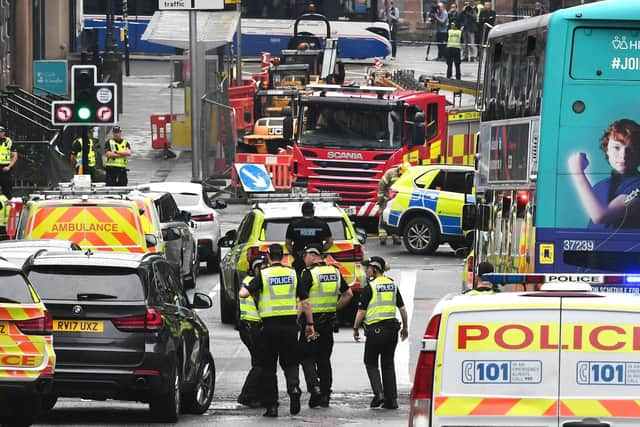Park Inn Hotel stabbings: Demand for inquiry into ‘dysfunctional’ asylum system
On Saturday, several dozen demonstrators gathered in Glasgow’s George Square, exactly one year on from the attack, carried out by Badreddin Abadlla Adam., 28, from Sudan.
The 28-year old, from Sudan was shot dead by police after his knifing spree at the Park Inn Hotel in Glasgow last June, which left six people injured, including 42-year-old police constable David Whyte.
Advertisement
Hide AdAdvertisement
Hide AdRights groups say asylum seekers were moved en masse to “asylum hotels” abruptly during the height of the pandemic, suggesting the “unsuitable and unsafe conditions” brought about a widespread decline in mental health among residents.


Adam’s first victim, Max Aubin, told the PA news agency how he now “spends a lot of time in my house”, adding: “I don’t want to go outside, I can’t trust people, I don’t know their mentality.”
The 21-year-old asylum seeker, who said he fled the Ivory Coast due to religious persecution, said he had his spleen removed after being set upon and still suffers the mental effects of being stabbed without warning.
He said: “I’m just trying to deal with it. I want to be independent.
“I was the first person he stabbed, he just said ‘hello’ and then started stabbing me.
“If it wasn’t for the charities I wouldn’t be here today. But I want to be independent, I don’t want to have to get given things, to depend on charities and groups.
Glasgow group Refugees For Justice, established after the attack, is calling for an inquiry into the “avoidable tragedy”.
Spokeswoman Pinar Aksu said: “Serious mistakes were made, warnings were ignored and chances to intervene and prevent it happening were missed.”
Advertisement
Hide AdAdvertisement
Hide AdShe added that refugees and asylum seekers “were abruptly uprooted from their homes and moved en masse to ‘asylum hotels’ at the height of the pandemic”.
Ms Aksu said: “We believe that decision and the living conditions of the people in the hotels played a significant role in setting off this terrible chain of events.”
A refugee who gave his name as Abdulla, 37, from Sudan, said he endured 11 months in an Ibis hotel after being given just 30 minutes’ notice before being uprooted from a flat he was living in.
The qualified medical doctor told PA: “It was horrible. They looked down on us like we were nothing or nothing worth worrying about.
“A lot of people were suffering with mental health problems, stress, anxiety, it’s something inside, that you don’t always see.”
Sidratu Bangura told the crowd: “Every one of us has a potential in us. We come here, some of us have been trafficked, some have been violated in our country.
“We don’t want to be lazy, to depend on you people, allow us to work, allow us to develop ourselves, to make an impact.”
Earlier this month, the BBC reported there were 200 asylum seekers living in hotels across Glasgow.
Advertisement
Hide AdAdvertisement
Hide AdThe Home Office has previously defended the measures, saying: “Like everyone else in the country during the coronavirus outbreak, asylum seekers have been asked to stay where they are and to follow social distancing to help fight the spread, which has meant standing up temporary accommodation.”
